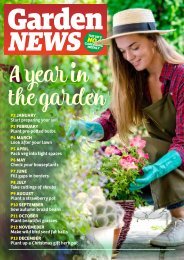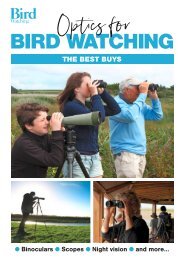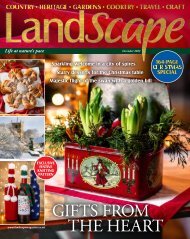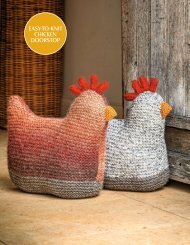You also want an ePaper? Increase the reach of your titles
YUMPU automatically turns print PDFs into web optimized ePapers that Google loves.
Help your<br />
GARDEN<br />
NESTING BIRDS<br />
What some of our<br />
most common<br />
garden nesters may<br />
be up to this month<br />
BLACKBIRD<br />
Our most common and familiar thrush is<br />
so well known it doesn't even have<br />
‘thrush’ in its name. Abundant and<br />
present on just about every lawn. Males<br />
are black with an orange-yellow bill and<br />
eye-ring. Females are dark brown and<br />
a bit spotty, betraying their thrush genes.<br />
SPRING ANTICS<br />
Males sing one of the most beautiful<br />
songs of all British birds, especially at<br />
dawn and dusk. Fluty and rich, with<br />
complex phrasing (lacking the repetition<br />
of the Song Thrush’s ditty). Females may<br />
be seen gathering moss and small twigs<br />
to make a nest.<br />
NEST TYPE<br />
Classic cup-like nest of twigs and moss<br />
concealed in a bush or hedge. May use<br />
open-fronted nestboxes or equally use the<br />
nestbox roof as a platform for a nest.<br />
How you can help<br />
Don’t trim bushes or hedges during the<br />
breeding season. Keep cats indoors or<br />
away from the lawn and with no access to<br />
possible nests.<br />
Tim Gainey/Alamy*<br />
ROBIN<br />
Everyone knows the Robin, our<br />
‘almost official’ national bird. Males<br />
and females look the same. It is only<br />
during the breeding season that you<br />
will see two Robins tolerating each<br />
other’s presence in the garden.<br />
SPRING ANTICS<br />
Though both sexes sing in the winter,<br />
it is just the males that sing their<br />
delightful ‘liquid silver’ song during<br />
the spring (including at night time in<br />
some cases). The pair will become<br />
defensive of the territory, seeing off<br />
intruders. You may even see some<br />
feeding of the female by the male on<br />
completion of the nest.<br />
NEST TYPE<br />
They nest in concealed hollows in<br />
natural spaces or any cavity they can<br />
find (in an old boot or kettle!); though<br />
will take to open-fronted nest boxes.<br />
How you can help<br />
Don’t disturb nesting Robins. As with<br />
Blackbirds, try to prevent cats from<br />
attacking the youngsters. Keep providing<br />
bird food and water.<br />
Dave Watts/Alamy*<br />
10 Create the Perfect Bird Garden <strong>2018</strong>

















